|

THE DOMESTIC VIOLENCE
CYCLE
ANTI-DOMESTIC VIOLENCE SUNDAY
LECTIONARY COMMENTARY
Sunday, July 28, 2013
Malene Minor Johnson, Guest Lectionary Commentator
A Ph.D. student in the Theology, Ethics, and Human Sciences program of Chicago Theological Seminary, Maleneís area of interest includes the intersections of womanist theology, human dignity/humiliation studies, and capitalism.
Lection Ė Malachi 2:13-16 (New Revised Standard Version)
(v. 13) And this you do as well: You cover the Lord’s altar with tears, with weeping and groaning because he no longer regards the offering or accepts it with favor at your hand. (v. 14) You ask, “Why does he not?” Because the Lord was a witness between you and the wife of your youth, to whom you have been faithless, though she is your companion and your wife by covenant. (v. 15) Did not one God make her? Both flesh and spirit are his. And what does the one God desire? Godly offspring. So look to yourselves, and do not let anyone be faithless to the wife of his youth. (v. 16) For I hate divorce, says the Lord, the God of Israel, and covering one’s garment with violence, says the Lord of hosts. So take heed to yourselves and do not be faithless.
I. Description of the Liturgical Moment
Thirteen years ago, Domestic Violence Sabbath Observance (DVSO) was established by The Black Church and Domestic Violence Institute. The DVSO includes services intended to educate congregations and honor survivors of domestic violence. While there are churches that observe this Sabbath, all too often there is a continued silence or at minimum cursory consideration of domestic violence in churches. However, when we take into account that incidents of domestic violence tend to rise in the hours following Sunday morning church services, that 25% of Christian homes witness abuse of some kind, and that more than 50% of pastors in a survey said that women should be willing to “tolerate some level of violence” because it is better than divorce,1 it is clear that churches in general and African American churches in particular and their leadership cannot afford to ignore or gloss over issues of domestic violence. Proper exegesis and interpretation of the Scriptures is needed in order God’s righteousness be manifest. Additionally, Anti-Domestic Violence Day is the time when churches intentionally acknowledge our collective and individual responsibility to support and honor survivors of domestic violence. It is also the occasion when we discuss ways to end domestic violence, safeguard victims, and remember those who have been maimed or killed at the hands of their abusers.
III. Biblical Interpretation for Preaching and Worship
Part One: The Contemporary Contexts of the Interpreter
On Thursday, March 7, 2013, President Barack H. Obama reauthorized the Violence Against Women Act (VAWA), signing it into law with added protections and resources. The law, which was first established in 1994, is intended to protect women from domestic violence, sexual assault, and human trafficking while it also allows the federal government to spend money to treat victims and prosecute offenders.
Even as we celebrate the passage of this law, the National Violence Against Women survey indicates that almost 1 in 3 African American females has been subject to intimate partner violence. Intimate partner violence includes rape, physical assault, or stalking.2
Part Two: Biblical Commentary
The text, written after the Babylonian exile in the period of 539Ė332 BCE, closes out the Hebrew Bible (Old Testament) for Christianity. For Christians, Malachi serves as a transition between the Bible’s Old and New Testaments, while in Jewish Bibles, Malachi acts as “the seal of the Prophets,” including the minor and major prophets. Malachi, whether the proper name of a prophet or a title meaning “my messenger,” continued in the prophetic tradition of the prophet Zechariah as the book “introduced new perspectives for his time and the generations to come.” It is from this vantage point that we consider the text of Malachi 2:13-16.
And this you do as well: You cover the Lordís altar with tears, with weeping and groaning because he no longer regards the offering or accepts it with favor at your hand. (v. 13)
Malachi declares that though an offering is made to the Lord, it is neither appreciated nor acceptable to God, which elicits strong emotion from the giver.
You ask, “Why does he not?” Because the Lord was a witness between you and the wife of your youth, to whom you have been faithless, though she is your companion and your wife by covenant. (v. 14)
The Lordís rejection of the offering engenders a question of why. It is as if the one who gives the offering expects that because he has kept the law and brings an offering to the Lord, that the Lord is obligated to accept it. Malachi prefigures Jesus in that his response to the giver of the offering suggests that keeping of the law is more than a matter of rudimentary action. Rather God still determines the conditions under which God will determine if an offering is worthy.
Malachi informs the giver of the offering that God has witnessed the relationship between the man and his wife and sees that the man has broken fellowship with his wife as well as his covenant by being unfaithful. Returning to Godís role as a witness, by invoking the covenant, God reminds the man that though it appears he has been unfaithful only to his wife, he has also been unfaithful to God, as the covenant is between God, the man, and his wife.
Also, some versions of this text equate the manís faithlessness to dealing with his wife treacherously, that this unfaithfulness has been a deliberate act of betrayal toward not only her but also the covenant, rendering him unpredictable and unstable. These are often precursors to violence.
Did not one God make her? Both flesh and spirit are his. And what does the one God desire? Godly offspring. So look to yourselves, and do not let anyone be faithless to the wife of his youth. (v. 15)
God desires for the man and his wife to have children who will honor God and keep Godís covenant. God intimates that it is God and God alone who created the man and the woman both in flesh and spirit. Therefore, take heed to all of Godís creation. Honor the marriage covenant by taking responsibility and guarding the flesh and spirit from faithlessness. For by dishonoring the marriage covenant, it jeopardizes the creation of Godly offspring who act faithfully and without the blemish of violence.
For I hate divorce, says the Lord, the God of Israel, and covering oneís garment with violence, says the Lord of hosts. So take heed to yourselves and do not be faithless. (v. 16)
This verse is problematic for a couple of reasons. First, in Hebrew, there is no first-person pronoun. In other words, God does not refer to God’s self as I. Thus, to maintain the integrity of the prophetic nature of the text, “says the Lord, the God of Israel” is retained in order to assure that it is God’s covenant that is being challenged by the man’s unfaithfulness.
The second problem with the first portion of this verse where the Lord declares that God hates divorce is that it has often been used to keep women trapped in relationships and marriages that are dangerous and abusive. What is missed and/or avoided is the context of Godís declaration. By following the earlier verses explaining the covenant that the man has broken by his unfaithfulness, God suggests divorce might be a consideration.
In addition to hating divorce, God also declares his hatred for covering oneís self with violence. God, in essence, equates violence with divorce, which is the result of faithlessness. This violence takes the form of brutality whether in word or deed. While garment acts as a metaphor for his wife, thus he overwhelms or covers his wife with violence. As well, his divorce and violence are seen as the result of not having guarded oneís flesh and spirit from treachery of deliberate faithlessness. Again, God requires accountability for the marriage, which cannot be traded for violence, betrayal, instability, or faithlessness, for God remains a witness.
Challenge
Often batterers abuse in secret and threaten their victim with further violence if she tells what has happened. Malachi reminds us that God is a witness. As God witnesses the relationship between the man and wife, challenging the man to take heed to himself, God also witnesses what we do or do not do in order to hold the abuser accountable, to protect the victim, and to stop further violence.
In the African American Churchís desire to put forth an image of respectability, we must remember that just as God witnesses between a husband and wife, God also witnesses each time the community of faith dismisses, shames, ignores, or avoids incidents of domestic violence. As God calls forth an end to domestic violence, God is also calling the community to take heed of itself; for if we continue on this path we too cover ourselves with violence and put our relationship to God at risk of rejection.
Descriptive Details
The descriptive details in this passage include:
Sounds: A man groaning and wailing as tears fall from his eyes (v. 13);
Sights: A man full of sorrow (vv. 13-14); a confused man whose offering to God has been rejected (v. 14); a woman dejected, abused, and feeling isolated and hopeless (v.14); God standing as witness and judge (vv. 14-15).
III. Additional Suggestions/Resources for Preaching and Teaching
Historically, domestic violence has been defined as a women’s issue, an issue cutting across every socioeconomic, racial, and ethnic category. The benefit of defining it as a women’s issue has allowed for the gathering of information about the victims as well as has taught us how to best protect them. However, in limiting domestic violence to a women’s issue, men, the predominant perpetrators/batterers, are often left out of the process that leads toward solution. The Malachi text provides an example of not only protecting the victim of spousal abuse, including the children, but also holding the abuser accountable. God’s prophet Malachi addresses the perpetrator directly, letting him know “I see you and what you do. I will not accept your offerings to me, as I know of the violence that you visit upon your wife and the destruction that it brings for the community. Remember and honor your covenant, says the Lord.”
1 John 4:20 declares: “Those who say, ‘I love God,’ and hate their brothers or sister, are liars; for those who do not love a brother or sister whom they have seen, cannot love God whom they have not seen.” The Malachi text is the epitome of this New Testament Scripture, as God challenges the husband’s show of love for a God he cannot see and the violence toward his wife whom he can see.
General Statistics on Domestic Violence:
- According to the U.S. Department of Justice, 1 in 4 U.S. women will experience intimate partner violence
- Approximately 4.8 million intimate partner rapes and physical assaults are perpetrated against U.S. women annually.3
- According to the U.S. Surgeon General, domestic violence is the leading cause of injury to American women.
- Young women between ages 16Ė24 have a higher incidence of partner violence than any other age group.
- Nearly 1 in 5 teenage girls who have been in a relationship said a boyfriend threatened violence or self-harm if presented with a breakup.4
Resources for Research, Pastoral Care, Teaching, Preaching, and Social Justice
Recordings/Webinars/Videos for Training
- Faith Trust Institute is a national, multi-faith, multicultural training and education organization with global reach working to end sexual and domestic violence. Online location: http://www.faithtrustinstitute.org
Sampling of Free Webinars from the Faith Trust Institute
- Safe Congregations and Risk Reduction: A Starter Kit
- Men Stopping Violence: Because We Have Daughters
- Kids Exposed to Domestic Violence: How Can Faith Leaders Respond?
- Roundtable: Community Based Intervention for Batterers and the Role of Faith Communities
- Excerpt from DVD “Wings Like a Dove: Healing for the Abused Christian Woman.” Online location:
http://www.youtube.com/watch?v=hO9Ih0ugzu0&list=UUnRviVBa4TZC1q6olZ6xXRg
Books
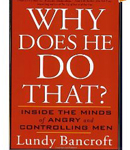 |
Bancroft, Lundy. Why Does He Do That? Inside the Minds of Angry and Controlling Men. New York: Berkeley Books, 2002. |
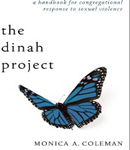 |
Coleman, Monica A. The Dinah Project: A Handbook for Congregational Response to Sexual Violence. Eugene, Oregon: WIPF and STOCK Publishers, 2004. |
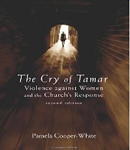 |
Cooper-White, Pamela. The Cry of Tamar: Violence Against Women and the Church's Response. Minneapolis: Fortress Press, 2012. |
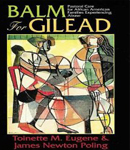 |
Eugene, Toinette M. and James Newton Poling. Balm for Gilead: Pastoral Care for African American Families Experiencing Abuse. Nashville: Abingdon Press, 1998. |
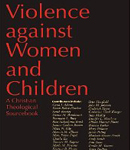 |
Fortune, Marie M. and Carol J. Adams, eds. Violence against Women and Children. New York: Continuing Publishing Company, 1995. |
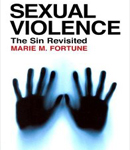 |
Fortune, Marie M. Sexual Violence: The Sin Revisited. Cleveland: Pilgrim Press, 2005. |
 |
Miles, Al. Domestic Violence: What Every Pastor Needs to Know, 2nd ed. Minneapolis: Fortress Press, 2011. |
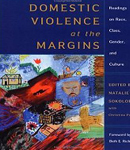 |
Sokoloff , Natalie, J. with Christina Pratt. Domestic Violence at the Margins: Readings on Race, Class, Gender, and Culture. Piscataway, NJ: Rutgers University Press, 2005. |
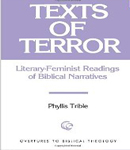 |
Trible, Phyllis. Texts of Terror: Literary- Feminist Readings of Biblical Narratives. Philadelphia: Fortress Press, 1984. |
 |
Weems, Renita J. Battered Love: Marriage, Sex, and Violence in the Hebrew Prophets. Minneapolis: Fortress Press, 1995. |
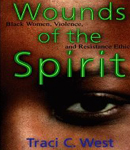 |
West, Traci C. Wounds of the Spirit: Black Women, Violence, and Resistance Ethics. New York: New York University Press, 1999. |
Notes
1. http://www.religiontoday.com/news/domestic-violence-within-the-church-the-ugly-truth-11602500.html (accessed 6 February 2013).
2. http://www.womenshealth.gov/minority-health/african-americans/violence.cfm (accessed 6 February 2013).
3. Extent, Nature and Consequence of Intimate Partner Violence Research Report https://www.ncjrs.gov/pdffiles1/nij/181867.pdf
4. 2000 National Violence Against Women Survey, National Institute of Justice & Centers for Disease Control and Prevention.
|